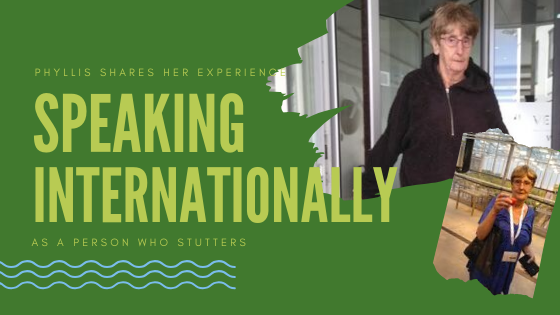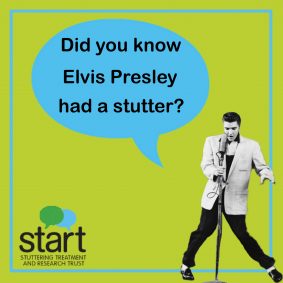Phyllis shares her experience speaking at International Stuttering Association’s World Congress 2019
In July 2019, Phyllis Edwards travelled to Iceland to attend the International Stuttering Association’s World Congress 2019. The theme was Embrace Your Stutter.
Phyllis lives in Paraparaumu on the Kapiti coast just outside of Wellington, and first made contact with START last year. She works for Castle Kids Kapiti and is very keen to share her story of growing up with a stutter in order to help others (particularly women) on their own stuttering journey. She has kindly offered to share with us her experience of speaking at an open microphone session at the World Congress. We hope you enjoy reading this as much as we have.
Thanks so much Phyllis for sharing so openly and honestly with us all.
Here I am sitting in the second row from the front in the Ork Hotel Conference Room feeling both excited, nervous and blessed that I got here. I am glad I hadn’t managed to talk myself out of it like part of me had tried to do.
In fact, I did quite a bit to try and prevent my being here. First, I had sent an email to Gina, our travel agent saying “Please tell me it is not possible for Donald and I to go to Iceland”. Gina, unfortunately, emailed back saying “Phyllis it is very possible”. Then, as we were going in to our annual bank review the ever-supportive Donald said “Phyllis I am going to ask to put the money for the trip on to our mortgage.” “No“ I protested. “Yes” said Donald “I believe in you.”
Try as I might to self-sabotage, I still made it to Iceland.
At least I was dressed for success. I was wearing a comfortable top given to me by our manager Tess, designer undies made with love from my trusty YouTube friend Lauren, and jeans from my friend and ex-supervisor Karen. My plan was if I wore clothes from people who believed in me, I would believe in myself too.
Then it all began.
The woman hosting the session said Anita Blom (international speaker, person who stutters, and my own mentor), would be sharing her keynote address after the open mic. Two people who I thought were amazingly brave got up and spoke. Then I heard the host offer one more chance for people to speak during this open mic session. “Who would like to speak” she asked.
My hand (that is known for having a mind of its own) shot up and I heard this voice calling out “Me, me please my turn”. The woman smiled, and held the microphone out as I rushed up. I opened my mouth and I heard this person saying “Hello, my name is Phyllis Edwards from New Zealand. Thank you for having me.” I then heard a fluent voice talking over me – I realized it was me speaking. “Oh no,” I thought, “What do I do now if my mouth won’t work?”
Suddenly I had this picture in my mind of the friends I knew were supporting me back home. I
thought of Alexis Parker, my adopted English sister who also stutters, Janelle from START, who I am proud to be affiliated with, and Anita Blom who had mentored me and suggested it was my turn to pay it forward. She mentioned this after I contacted her when returning from the British Stammering Association national Conference held in Cardiff Wales. That time I had left feeling disappointed in myself for not speaking during the open mic session. But not this time.
This time I felt strong and supported and wanted to do this for me and for others. I started sharing about my mum telling me my dad would come back if I talked properly, and about thinking I had a ‘tongue monster’ in my throat. I was able to share about being lucky enough to have been able to follow my dream of being an Early Childhood Teacher with a stutter. My story came flooding out of me.
I finished by sharing how at age 65 I realized that if I hadn’t had a stutter, my life may have gone in a completely different direction. I would not have amazing supportive close friendships, be in a job I loved where children and parents accepted me. These children have touched my heart and have taught me having a stutter didn’t matter. They have showed and taught me love, acceptance, and generosity by building these relationships with me. Also, it’s worth noting that without my stutter I might not be the interesting, quirky, prank-playing wife, mother, and friend I am today.”
And just like that, I thrust the microphone back into the host’s hand afterwards. All I wanted was to sit back down, curl up in my seat and listen to Anita’s keynote address. It seemed like it all went quiet, but then I heard what I thought was an earthquake. There was lots of noise, and I remember thinking “Oh that’s me! I have caused an earthquake or broken something!” I remember clutching the hands of the woman sitting next to me and then I slowly realized people were clapping and cheering and I saw some people standing up in my row. ‘’
It was awe-inspiring. Dropping back down into my seat, I was still quietly crying, feeling
overwhelmingly grateful for the opportunity to share my story, and overcoming my fear of standing up there with that microphone.
All at once I felt humble, lighter, healed, and relieved that I hadn’t broken anything or caused an earthquake.
If sharing my story can help just one young woman realise what I have realised at an earlier age than me, then to have a stutter may not be such a bad thing.
We couldn’t be more proud of you Phyllis, and we know the strength of your story has the power to change the lives of people who stutter.





 There has been some research on the phenomenon, with
There has been some research on the phenomenon, with 
 Anna Hearne, our Massey University -based Speech Language Therapist says “
Anna Hearne, our Massey University -based Speech Language Therapist says “
 Stuttering among children is far more common than among adults with approx 10% of children developing a stutter at some stage in the preschool years. However, for unknown reasons, likely linked to the still developing brain, many pre-school children naturally stop stuttering and don’t require therapy.
Stuttering among children is far more common than among adults with approx 10% of children developing a stutter at some stage in the preschool years. However, for unknown reasons, likely linked to the still developing brain, many pre-school children naturally stop stuttering and don’t require therapy. Adults who stutter are likely to have been living with their stuttering since childhood. Adults who stutter are likely to have had treatment in the past (which may or may not have been helpful). However often at significant transition points such as finishing study and applying for jobs it can be helpful to review techniques and receive support from a Speech Language Therapist.
Adults who stutter are likely to have been living with their stuttering since childhood. Adults who stutter are likely to have had treatment in the past (which may or may not have been helpful). However often at significant transition points such as finishing study and applying for jobs it can be helpful to review techniques and receive support from a Speech Language Therapist. 



 The reason that both stutter and stammer exist and describe the same
The reason that both stutter and stammer exist and describe the same 

 Most communication is two-way. It involves an unpredictable conversation, where you can’t plan your next answer. It also holds the potential for the other person or people to interrupt, or to become impatient. Singing, however, is mostly one-way communication, and eliminates the possibility for these challenges. We have often memorised the lyrics when we sing, rather than facing an unpredictable conversation, and unless we are at karaoke it’s unlikely anyone in the audience is planning to interrupt.
Most communication is two-way. It involves an unpredictable conversation, where you can’t plan your next answer. It also holds the potential for the other person or people to interrupt, or to become impatient. Singing, however, is mostly one-way communication, and eliminates the possibility for these challenges. We have often memorised the lyrics when we sing, rather than facing an unpredictable conversation, and unless we are at karaoke it’s unlikely anyone in the audience is planning to interrupt.